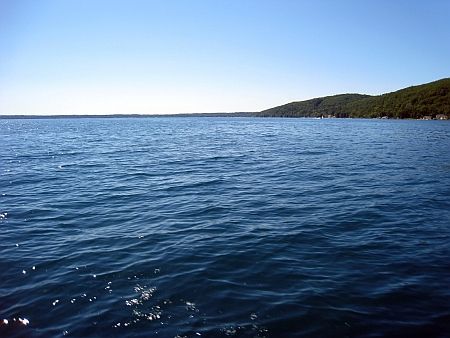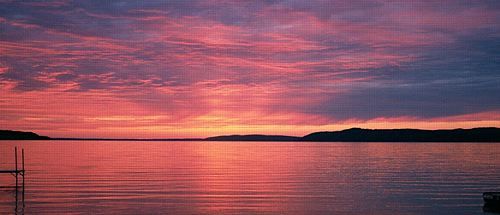One of the first books I checked out of the Beulah Library was “Good
Night, Sweet Prince”, Gene Fowler’s biography of the great actor John Barrymore. Fowler
eloquently described Barrymore’s obsession with a map of Scotland that
detailed an obscure range known as “The Grampian Hills”. The Grampian Hills ultimately became
Barrymore’s own Elysian Fields: serene, magical, unattainable, a nepenthe in
which all his sorrows were washed away.
Barrymore was ultimately doomed by alcohol, his own personal demon; but
the image of the Grampian Hills was a powerful one for me. A land, imagined with midnight blue lakes,
sunswept fells and overarched by an endless sky
 The ridges and moraines that surround Crystal Lake were like the Grampian Hills to
me. Deep and intensely green at noon, they flowed to gray, blue and finally
black in the darkening sky at sunset, seemingly eternal (even though ephemeral in the geologic time
of once glaciated Northern Michigan). The lake was equally as mysterious: two hundred feet deep, varying
between turquoise and navy, laced with white caps, and with water so clear that
I picked out a huge Petoskey stone and dove through twenty feet of icy cold
water to retrieve it from the sandy lake bottom. The Petoskey stone now sits on my desk, a
silent semaphore.
The ridges and moraines that surround Crystal Lake were like the Grampian Hills to
me. Deep and intensely green at noon, they flowed to gray, blue and finally
black in the darkening sky at sunset, seemingly eternal (even though ephemeral in the geologic time
of once glaciated Northern Michigan). The lake was equally as mysterious: two hundred feet deep, varying
between turquoise and navy, laced with white caps, and with water so clear that
I picked out a huge Petoskey stone and dove through twenty feet of icy cold
water to retrieve it from the sandy lake bottom. The Petoskey stone now sits on my desk, a
silent semaphore.
I didn’t, couldn’t know it then, but growing up in Northern
Michigan was a magical time; I was blessed with the freedom and
the resources to sail the lake, ride my bike through the hills, lie on the
beach at Elberta and watch the sky shimmer with boreal fire. My mother, who was
an unhappy person, encouraged me to stay out of her way, and from an early age
I learned to tread lightly around her. My father came on the weekends, and
generally regarded me as a strange creature from another planet that he would
never understand. So, the library, the lake and the sky occupied me.
My first
job was working at Horizon Books. I spent a lot of time
there, so much so that the owner hired me on part time to help with cleaning,
restocking and supervising the half off rack that was parked on the sidewalk
just outside the door. Looking back now, I think it was one of the best
jobs I ever had; the hours were flexible around my sailing time, I got to read
every book I could lay my hands on, and this was the place where I met Bruce
Catton.
Mr.
Catton was a bit of a North Michigan legend: a
famous Civil War historian and Pulitzer winner. Despite his local hero status, he was a
remarkably pleasant and unassuming man. He visited the bookstore several
times a week, and was clearly amused by my wide eyed awe. Mr. Catton
would sometimes come and perch on the bench by the front door while I was guarding
the half price books. As the afternoon
shadows lengthened across the sidewalk, he would gently ask me questions about
literature, history, poetry, music, Crystal
Lake. He had much to say, but most of it told in
stories of his youth growing up in the area, his time at Oberlin College,
surviving World War I and the Spanish Flu and his interest in the War Between
the States. I was immensely flattered that he treated my thirteen year old self
like an adult and worthy of an opinion about What It All Means. He was my first editor, looking
over my adolescent short stories and poems and returning them with proof marks
and serious commentary in the margins. Seeing
these manuscripts now, I cringe with embarrassment at just how bad they are;
but I believe he took just as much time with them as he would with a post
graduate’s treatise on the Battle
of the Wilderness. I can see now that I
idolized this kind gentleman, but it was those long conversations that propelled
me into reading more, thinking more, writing more, taking chances and making
the leap into the university.
The summer waned; my
family returned home to Grand Blanc, and to a winter of cold rain, dirty snow, and a steel gray
blanket of clouds which the sun never seemed to penetrate. But, as they
say, the promise of spring lies under the snow, and sometime round the middle
of April, the clouds lifted, the sun emerged, and the black, icy drifts
vanished. Springtime in Michigan
can be an amazing, almost fluorescent green, ephemeral as a breath of air.
Then, Memorial Day, school was out and we were back at Crystal Lake, to my job and another pleasant
summer of reading, sailing, riding my bike and conversing with Mr. Catton. Years passed.
But time was holding all of us, green and dying; time was running out.
The last time I saw Mr. Catton, he looked thin and wan. He asked how my studies were progressing and
offered advice and encouragement. I
remember that I told him that I had read his autobiography and how much I
enjoyed hearing his story, told in his words He smiled at me and his hand clasp
crackled like dry straw. “Keep writing,”
he said. “Your words will guide you all
the way home.” I didn’t understand what
he meant, but impulsively I hugged him farewell. His frail body felt like paper and sticks
under my hands. I never saw him again; Mr. Catton died shortly after that encounter.
When I heard the news, I went and sat on the seawall with my arms looped around
my knees, looking West, and watched the sun set behind the Grampian Hills,
shading the lake in lavender, pink, blue, scattered with molten gold; then the
twilight for an hour; stars, a black sky, northern lights. I realized that he knew he was dying at our
last meeting, and somehow those words were a message. And now he was gone. The water whispered over the sand beach and
it was the loneliest sound in the world.
I always meant to go back to Crystal
Lake but after my mother died, my father sold his
summer place, married again, and started a new life. There was really nothing
there for me anymore, just memories. Going
home is a questionable business. You can
never truly look back, relive the past, find the lost; but life has a way of
fooling with you. A friend’s daughter attended
the National Music Camp at Interlochen this summer. Pictures and videos appeared on Facebook, and
it was the Grampian Hills all over again: the air full of music, Crystal
Lake an aquamarine gem, rolling fields, forests and sand dunes, Lake Michigan like a gunmetal mirror under a cold, clear blue
sky.
I observed all of this from a continent away as I was sweltering
through another Arizona
summer. Surrounded by towering
thunderheads and irritating dust, sweat trickling through my hair and down my
back, I was stewing in a sea of loneliness. Throughout my life I have stumbled
from one crisis to another, watching my world blow up in new and interesting
ways; but my husband’s death had drained me completely and left a vacuum that
nothing seemed to fill. On a miserably
hot August night I finished looking through those pictures from home and,
unable to stand it anymore, went outside.
The sky was lit with a fauvist sunset and thunder was rolling from
horizon to horizon; it seemed that the air was paralyzed with heat, waiting for
rain. Something just has to give, I
thought.
“Keep writing. Your words will guide you all the way home.” It was a blinding flash of insight. What was, is, and shall be. That will never change. I came inside, sat down and wrote. And wrote.
And wrote. I looked deep into the lake, broke the surface,
reached down and just began to understand that place, that time. And this place and this time.
“Life is a flame burning in
water, shining on a sea which has no shore, and far overhead there are other
flames which we call stars.” Bruce
Catton Waiting for the Morning Train

No comments:
Post a Comment